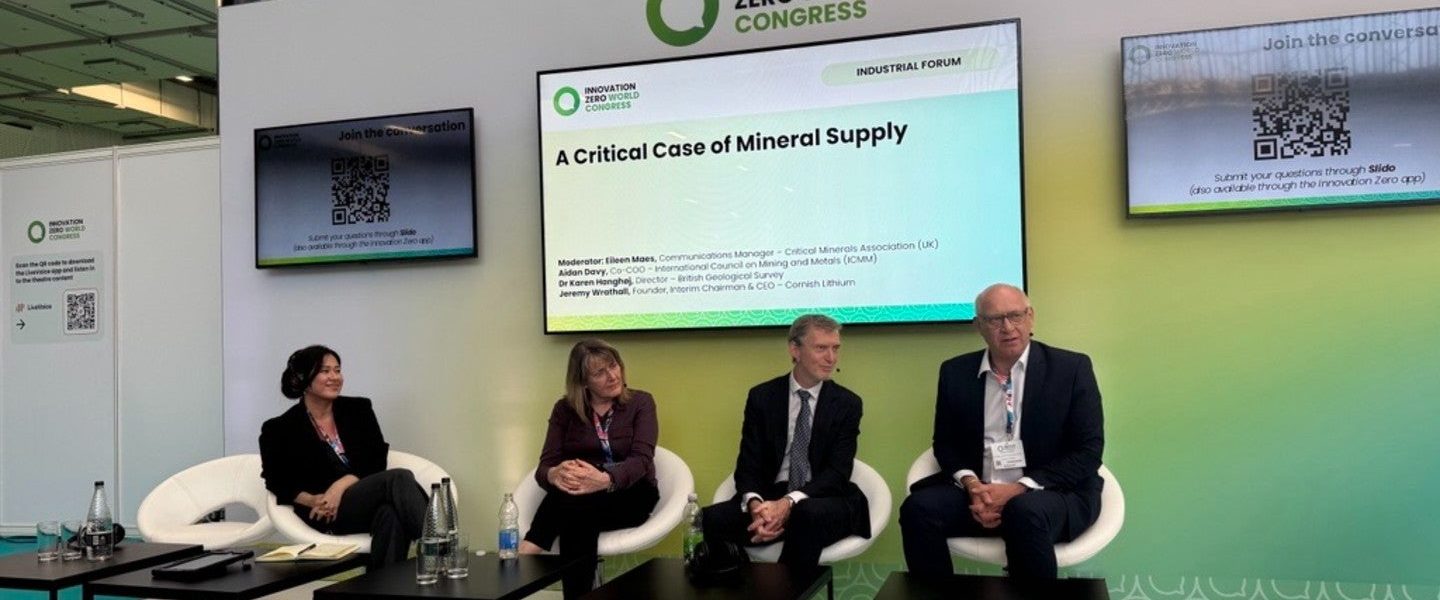
There is still an opportunity for the UK to take on a leadership role in critical minerals. However, the government’s critical minerals strategy – due to be released this year– is seen as pivotal for the country to position itself as a key player.
Speaking during a panel at the Innovation Zero World Congress in London on 29 April, Karen Hanghøj, director of the British Geological Survey (BGS), said the “window is still open” to achieve a fair and transparent sector globally and a level playing field for consumers ─ if minerals supply is looked at in a holistic way.
While the UK (or the EU) is probably not going to lead in terms of volume of critical minerals production, she said that both have “a lot of skills and the ability to influence how to do things responsibly”.
Hanghøj also suggested the UK should consider targets for critical mineral production, imports and recycling in its upcoming strategy, “to help take a more sustainable approach to minerals extraction”.
The EU has already adopted a similar approach through its Critical Raw Materials Act, which sets benchmarks for domestic supply of at least 10% in extraction, 40% in processing and 25% in recycling by 2030. It also mandates that no more than 65% of the EU’s annual critical raw materials consumption can come from a single third country.
Collaborating with the EU could offer the UK an opportunity to take global leadership as the two regions face similar problems and have similar values and approaches, Hanghøj said. For example, Europe (including the UK) consumes 30% of the world’s critical minerals production, but only “2–3% come out of our own subsurface”, she added.
Mining and processing of many critical minerals – used in almost all industries from medical devices to energy, technology and defence – is largely dominated by China.
Ongoing tensions between the US and China, and US President Donald Trump’s efforts to agree a critical mineral deal with Ukraine have brought the issue to the fore, highlighting the importance for countries to make supply chains more resilient to support national security objectives.
Strategy and strategic value
Jeremy Wrathall, founder, interim chairman and CEO of Cornish Lithium, acknowledged that the UK is in a rearguard action when it comes to critical minerals, stating that the forthcoming strategy is “absolutely key” to making sure the industry is fit for purpose for the next 100 years.
The UK needs to “be innovative and lead using our technologies to get back into the game”, he added.
The country needs critical minerals such as lithium, cobalt and graphite to make batteries; silicon and tin for electronics; and rare earth elements for electric vehicles, wind turbines and other high-tech industries.
One area where the British Government has shown leadership, according to Wrathall, is through permitting on a government scale rather than local scale. This is an approach being taken at the company’s Trelavour hard rock lithium project in Cornwall, south-west England, which is a “development of national significance”.
However, the panellists agreed that much of the delay in bringing new minerals project on stream stem from what Aidan Davy, co-COO of the International Council on Mining and Metals, termed an “irrational and illogical market” that recognises only the short-term returns rather than the strategic value of projects.
“It is incontrovertible truth that we will face copper supply shortages in the foreseeable future, but the price [environment] today does not support investments” in current copper production, Davy said.
Hanghøj also called for politicians and economist to consider a “slightly different business model” as part of the strategy, noting that the supply/demand model does not work well for metals/mining.
Panel moderator Eileen Maes, communications manager at the UK Critical Minerals Association, pointed out that the strategic value of critical minerals projects is being seen by UK and EU government, albeit slowly, but investors are struggling to see beyond the commercial lens.
Building on UK leadership for critical minerals
The panellists agreed that focusing the UK’s expertise in areas such as finance, chemistry and engineering could help position the country as a leader in critical minerals over the long-term.
The City of London’s leadership in mining finance and green investment, the UK’s historic chemical industry expertise and the BGS’ world-class geology capabilities are all areas the UK could leverage.
Davy, meanwhile, highlighted the ‘soft’ power the UK has through bilateral and multilateral development assistance in supporting responsible production from third countries. He also said the UK has the opportunity to do “much more” in this area to encourage broader assistance to support investments in economic infrastructure in mining-dependent countries.
Wrathall suggested an industrial cluster approach could dominate in the UK’s critical minerals strategy. Maes also pointed to a ‘regional cluster’ approach such as an extractive hub in Cornwall and Devon, a recycling hub in and around the Birmingham, and processing and refining hubs in industrial clusters and freeports such as Teeside and Humber.
Co-locating businesses in clusters enables them to take advantage of economies of scale, talent pipelines, land, supply chains and knowledge spill-overs, and is a core component of the UK’s industrial strategy.
Shifting narrative
Although critical minerals have been hitting the headlines over recent weeks and months, particularly vis-à-vis US intentions related to Ukraine and Greenland, supply chain concerns pre-dated Donald Trump’s US presidency.
Davy stated that the “totemic moment” for critical minerals was not the 2024 US presidential election, but rather the International Energy Agency’s 2021 report on the role of critical minerals in the clean energy transition.
Since its release he said there has been an “explosion” of policy developments related to critical minerals, with the initial dataset of 200 policies from November 2022 more than doubling to 450 by 2023.
According to Davy, these policies fall into two main areas: efforts to increase domestic production or refining capability and those to enhance supply relationships with third countries, which are inherently collaborative. However, he acknowledged that the ongoing tariff war and geopolitical environment is shifting the narrative.
“The tariff conversation is driven by a politics that runs contrary to collaboration, that is characterised by denial of privilege, grievance, coercion and zero-sum retribution, which completely changes the nature of the conversation,” Davy told Mining Technology.
Despite fear this is causing a shift away from environmental, social and governance (ESG) priorities, Maes noted that ESG “is still a forefront concern” for the mining industry.
On the specific topic of responsible mining standards, the sector needs to move towards “less complexity and more harmonisation”, Davy said, highlighting efforts by the Consolidated Mining Standard Initiative to combine four well-established standards into one global one.
The Innovation Zero World Congress took place in London on 29–30 April.

